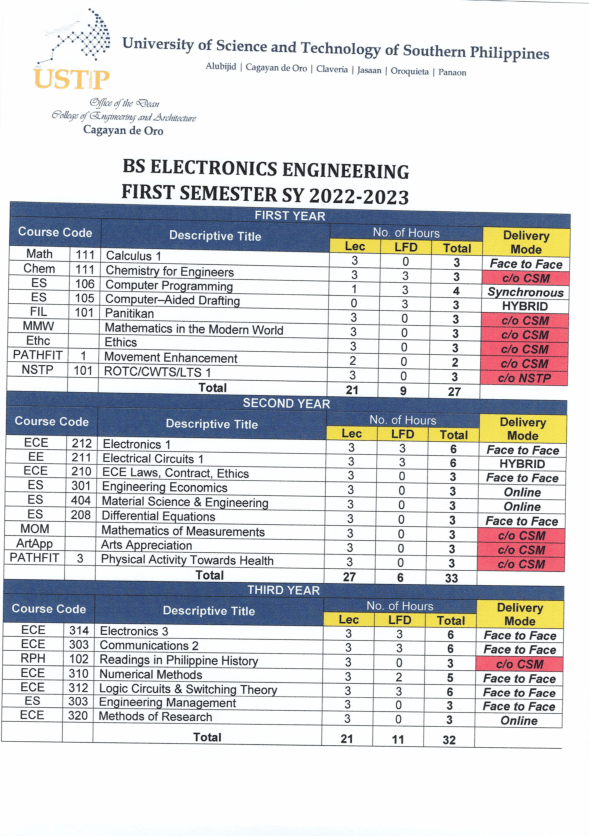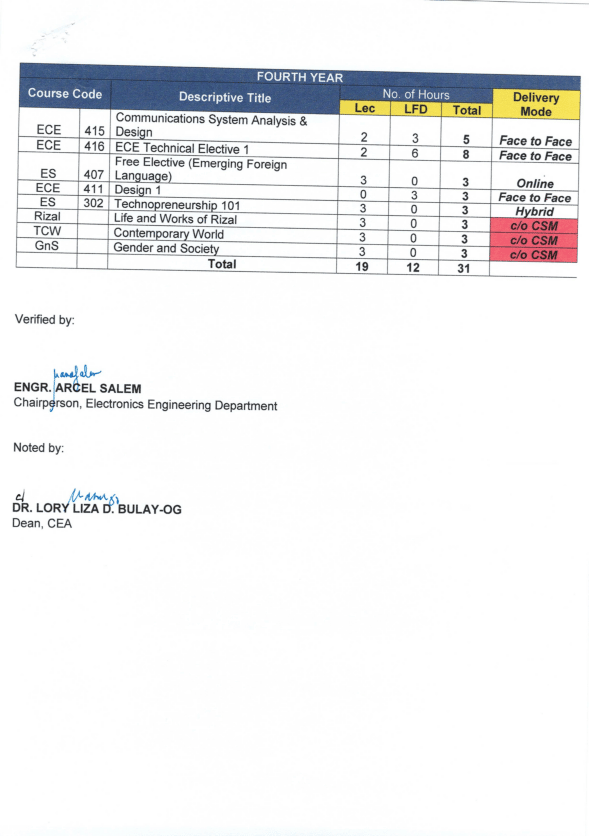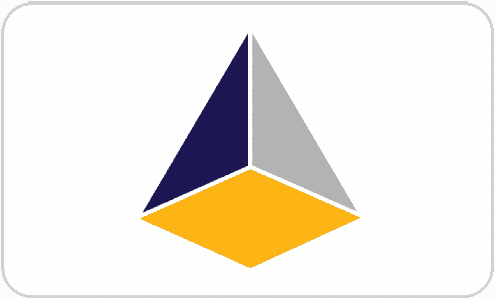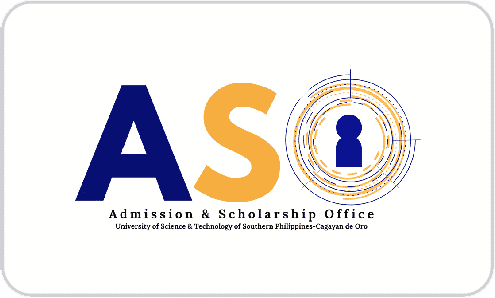MODALITY OF CLASSES



ELECTRONICS ENGINEERING EVENTS
ABOUT THE PROGRAM
The BS in Electronics Engineering is a 4-year engineering program that focuses on the ideation, design, and development of electronics and communications related products, systems, and services. There is a strong core of mathematics, physics, and engineering in its curriculum to provide teaching and training activities in the classroom and in the laboratory exercises. In USTP, two main electives are taught – the computer networks and systems and microelectronics IC design.
PROGRAM OUTCOMES
b.) Identify, research literature, analyze complex electronics engineering problems and formulate solutions using the principles of mathematics and engineering sciences.
c.) Design and implement systems, components or processes to meet desired needs with appropriate considerations for economic, environmental, social, political, ethical, public health and safety, manufacturability, and sustainability, in accordance with standards.
d.) Conduct investigation of complex electronics engineering problems using research-based knowledge in designing and conducting experiments as well as to analyze and interpret data to provide valid conclusions.
e.) Select, apply and create appropriate methods, resources, and modern electronics engineering and IT tools, including prediction and modelling with an understanding of the limitations, necessary for electronics engineering practice.
f.) Apply appropriate knowledge in the assessment and evaluation of subject matters pertinent to social, cultural and ethical responsibility relevant to professional electronics engineering practice.
g.) Assess and evaluate the impact and sustainability of electronics engineering practice in the solutions to the societal and environmental problems.
h.) Apply professional virtues and principles with strong commitment to moral and ethical responsibilities including respect for diversity during the course of electronic engineering practice.
i.) Demonstrate the ability to effectively convey ideas and information within the engineering profession and the general community when addressing complex engineering issues and activities, including unambiguous interpretation of data and instructions.
j.) Demonstrate capability to work competently in the context of diverse team within trans-disciplinary and multi-cultural environment as member or/and an inspiring leader with effective management skills to accomplish a team’s common goal.
k.) Engage in independent and life-long learning with considerations for contemporary issues and current trends for continuous self-improvement in engineering advancement and continual growth for local and global community.
l.) Demonstrate knowledge and understanding of engineering and management principles, economic decision-making, and technopreneurship skills in trans-disciplinary environment.
m.) Participate in the generation of new knowledge and advancement of existing knowledge, in research and development projects, and in technopreneurial activities in the areas of power electronics, instrumentations and control, with emphasis in telecommunications and ICT aligned to regional and national development agenda or goals.
n.) Promote and preserve the Filipino Culture and Heritage.
PROGRAM EDUCATIONAL OBJECTIVES
2. The graduates are adept in continuing professional development with strong moral values and are committed to life-long learning for protection of environment, public welfare and safety towards improvement of quality of life.
3. The graduates are proficient in research and innovation integrated with technopreneurship for society’s continual progress.
CAREER OPPORTUNITIES
Graduates of Electronics Engineering may pursue a career path in various semiconductor, electronics or telecommunications companies or government agencies that needs specialized Electronics and Communications services.
In the semiconductor and electronics field, they may apply as:
- Design Engineer
- Layout Engineer
- Production/Process Engineer
- Quality Engineer
- Computer Systems Engineer
- Instrumentation and Controls Engineer
- Biomedical Engineer
In the electronics systems, communications related firms, they may apply as:
- Telecommunications Engineer
- Optics Engineer
- Microwave Engineer
- Datacom Engineer
- Network Engineer
- Wireless Engineer
- Broadcast Engineer
- Field Engineer
- Satellite Communications Engineer

















